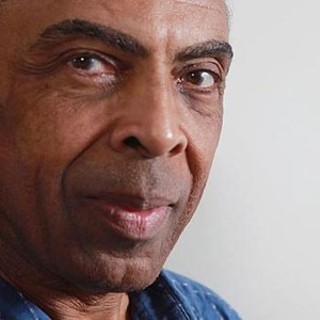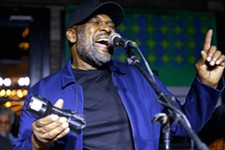Brazilian Broadband
Gilberto Gil Q&A
By Thomas Fawcett, 10:57AM, Tue. Oct. 30, 2012

Gilberto Gil remains an absolute giant of Brazilian music. While sitting in a parked car outside a Houston mega-church, the Chronicle spoke by phone with the famed singer-songwriter from his home in Brazil. Gil performs tonight at Bass Concert Hall.
Austin Chronicle: The concert you’re doing in Austin is a tribute to Luis Gonzaga, correct?
Gilberto Gil: Yes, because it’s the 100th anniversary of his birth. He passed away about 20 years ago [in 1989], when he was 77. So we're commemorating that, celebrating his memory and great contribution to national Brazilian music. This concert is based on the style he created and promoted, this pop Brazilian northeastern country music. I’m one of his disciples, one of his followers and an admirer of his work. I’m taking on this task of promoting and commemorating the moment, especially because it’s not a very known kind of music by Americans. I’m bringing it to the American public.
AC: Being from the northeast of Brazil yourself, what does his music mean to you personally?
GG: I was born in Salvador, the coastal area with a different culture, more directly African-influenced and by the Candomblé religion and everything. Very early in infant times, I was brought to the Caatinga. It’s dry and a very different cultural area inland of Bahia. It belongs to this whole cultural northeastern compound. I was brought there with the peasants, the troubadours, the violin and viola players, accordion players, and improvisers that used to rap – to use a modern word – about the lifestyle, their good and bad adventures.
I was brought to that kind of atmosphere, breathing that kind of air, talking that kind of language and everything. I’m a lover of that culture. It’s very different. It’s a very dry area, not much green. There are cattle. Musically, it’s a whole different thing compared to the rest of Brazilian music.
AC: He remained beloved to a lot of Northeasterners who moved to the big cities, correct?
GG: Definitely, in Rio, in São Paulo. More than that, not just carrying on the culture, but spreading it, diffusing it. In Rio for instance – the base city for samba and African rhythms as well as Bahia – both cities had contingents of people coming from inland northeastern areas and they would bring their musical traditions. As you said, carrying it on but more than that spreading it and infusing it, making it to become a national thing for everybody, for the whole country, not just restricted to northeastern communities in diaspora.
AC: You were an integral part of the Tropicália musical movement in the Sixties. What do you think has been the lasting legacy of Tropicália?
GG: I think the legacy of Tropicália is the concept of diversity and broadness itself. When Tropicália took place as a movement, we had been confined to specific areas. We had samba, we had baião, we had bossa nova, and we had Jovem Guarda, which was the first sort of rock & roll movement in Brazil. What Tropicália did was say you all belong to Brazil. You all represent Brazilian culture. Get the Beatles, get the Rolling Stones, get Bob Dylan, get Jimi Hendrix – get it all. Take elements from all those sources and mix it with Brazilian ones, and that’s what Tropicália did.
Tropicália essentially informed Brazil about its already ongoing diversifying process that we had going on in Brazilian music. That was the marriage of Tropicália. That’s the heritage of Tropicália.
[Gil backed by Os Mutantes]
AC: I have a particular interest in Brazilian soul music and I’ve done a bit of research on movimento black soul and artists like Tim Maia and Toni Tornado.
GG: Yeeeeeah! That’s another thread, another fiber.
AC: Do you consider yourself part of that movement at all?
GG: Yes. This movement has been very inspirational for us. Immediately after Tropicália, when me and Caetano [Veloso] got back from exile in London, that was the time that this movement was going on in São Paulo, in Rio, in places like Salvador and Belo Horizonte. We immediately identified with this movement. We supported the movement very strongly, especially because they had a difficult time with the law and the police because of the gathering of black communities in the slums, the favelas. They needed support from people like myself and Caetano who were already established and could bring some respect to their movement. So they’ve been part of our process as well.
AC: You mentioned your exile in London and the fact that both Tropicália and the soul movement were seen as threats by the dictatorship. What were they so afraid of?
GG: Social mobility, social dynamics, the discussion of different values. In a sense, fighting the traditional social and moral values. We were defying the system as usually movements do. And they were the system, the dictatorship. They were a very traditional and conservative government representing the state, representing cuts of liberty and a lack of freedom of speech and freedom of reunions and freedom of expression.
So we represented the whole other side – liberty, liberalism, freedom, and defying traditional ways of seeing life. That’s what they were afraid of.
AC: Having been exiled and at one point being considered an enemy of the state, what did it mean to you to be appointed minister of culture in 2003?
GG: It meant that signs of new times were about. New times, democratic times. Brazil at last being considered a global player and having a more dynamic economy and a more powerful cultural presence in the world. [President Luiz Inácio Lula da Silva] represented a post-dictatorial time. I think that was the main significance of my being the minister of culture.
AC: In that role you focused a lot on digital democracy and the digital divide. How far do you think we’ve come in that area?
GG: Ten years ago at the initial birth of the cyber culture, Internet and the whole computer movement was a whole new thing challenging us. I took myself as a promoter of this new culture, taking the main points, the main elements, and emphasizing the new possibilities brought by new technologies.
I recorded a whole album I titled Broadband [Banda Larga Cordel], associating new technology and new cultural possibilities and writing songs about this process. I talked about the open source movement and opened my archives to remixes and open access.
I did that about five or six years ago and now those things are becoming commonplace. Even the the old entertainment and media industry is becoming familiar with and exploring those possibilities. At the same time, we created a whole bunch of new individuals independent from the industrial system and they're creating the micro-industrial system themselves through blogs and social networks. It’s an ongoing thing now.
AC: There’s a new compilation of Tim Maia’s work. Did you know him well?
GG: [Laughing] Yes, I was a good friend of his. We share good feelings about this musical diversity. He was very much interested in northeastern Brazilian music as much as he was interested in samba, as much as he was interested in American soul music and American funk and jazz. He was great, very open, very broad in the sense that he was interested in Africa. He was interested in everything.
AC: You say that he was interested in northeastern music as well as American soul and African music. I see that in your music as well, along with an obvious interest in reggae and Jamaican music. What do you see as the common thread in the music of the African diaspora?
GG: Blackness. The creation of new worlds, new possible worlds. That’s it. Cajun music and salsa, samba and baião in Brazil, Mexican music connecting to South American music, and Uruguayan candombe and Argentinian tango. All of this has some black African ingredients in it, and some indigenous local ingredients in it, and then some European colonial ingredients in it. Those are the common elements.
A note to readers: Bold and uncensored, The Austin Chronicle has been Austin’s independent news source for over 40 years, expressing the community’s political and environmental concerns and supporting its active cultural scene. Now more than ever, we need your support to continue supplying Austin with independent, free press. If real news is important to you, please consider making a donation of $5, $10 or whatever you can afford, to help keep our journalism on stands.
Michael Toland, June 30, 2016
March 19, 2022
Gilberto Gil, Luis Gonzaga, Caetano Veloso, Tropicália, Os Mutantes, Beatles, Rolling Stones, Bob Dylan, Jimi Hendrix, Tim Maia, Toni Tornado









